Iran Warns Of Reciprocal Action Amid US Seizures Of Ships
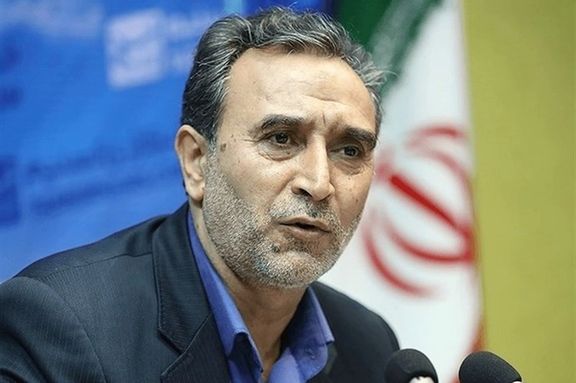
The legal advisor to Iran's president, Mohammad Dehghan, issued a warning on Thursday, stating that Iran would reciprocate if its ships were seized by the US for sanctions evasion.

The legal advisor to Iran's president, Mohammad Dehghan, issued a warning on Thursday, stating that Iran would reciprocate if its ships were seized by the US for sanctions evasion.
On February 2, the US Department of Justice announced charges related to terrorism and sanctions evasion, along with seizures linked to a billion-dollar oil trafficking network allegedly financing Iran's elite Islamic Revolutionary Guard Corps (IRGC) and other militant groups.
The department highlighted recent attacks attributed to Iran-backed militants, such as the October 7 attack by the Palestinian group Hamas on Israel and an attack in Jordan over the weekend that resulted in the death of three US soldiers. These incidents have drawn increased attention to Iran's illicit oil trade, according to the DOJ.
In addition to announcing charges, the DOJ reported seizing more than 520,000 barrels of Iranian oil aboard the crude tanker Abyss, which were covered by US sanctions.
"If an Iranian ship is seized, we will reciprocate and the legal way is not closed in this regard," legal adviser Dehghan said, adding that he was not able to confirm whether US authorities had seized an Iranian vessel.
In the face of international sanctions, Iran has developed intricate strategies to navigate its oil trade and circumvent restrictions. Despite facing severe limitations on conventional banking channels and trading platforms, Iran has resorted to various methods to sustain its oil exports.
One approach which has proven invaluable involves barter arrangements with allies such as China, where Iran trades its oil directly for goods and services, bypassing the need for traditional currency transactions. Additionally, Iran has leveraged alternative payment mechanisms and intermediary entities to skirt sanctions and facilitate oil transactions.
By utilizing unconventional routes and channels, including cryptocurrency and front companies such as those in the UAE and Turkey, Iran has obscured the origins and destinations of its oil shipments, making it challenging for international authorities to monitor and enforce sanctions effectively.
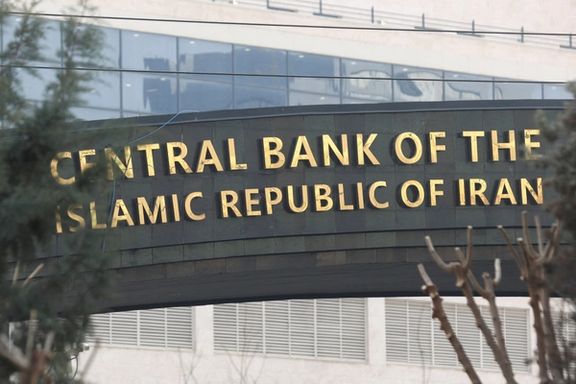
The United States has announced a new package of sanctions over a technology procurement network linked to the Central Bank of Iran, which has been finding ways to evade the measures.
The US Treasury said on Wednesday it had imposed sanctions on a subsidiary of the Central Bank of Iran (CBI), along with two entities based in the United Arab Emirates, one in Turkey and on three individuals for smuggling sophisticated US technology from over two dozen American companies to end-users in Iran, including the CBI.
In a statement, the Treasury noted the CBI is itself already under sanction for providing financial support to Iran's Revolutionary Guards’ Quds Force (IRGC-QF), an elite arm which carries out overseas operations, and on Hezbollah, a powerful Iranian-backed armed and political force in Lebanon.
“The Central Bank of Iran has played a critical role in providing financial support to the IRGC-QF and Hezbollah, two key actors intent on further destabilizing the Middle East,” said Under Secretary of the Treasury for Terrorism and Financial Intelligence Brian E. Nelson.
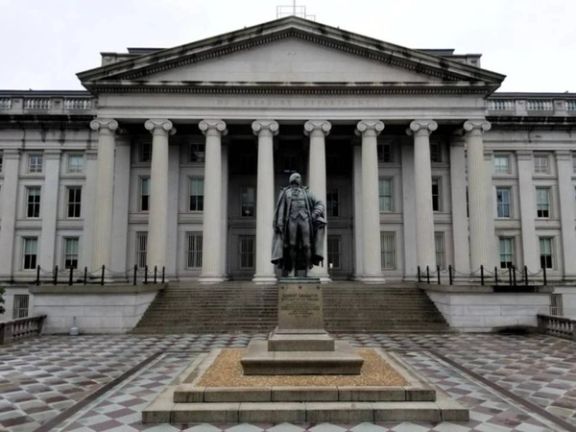
The Treasury named the entities as Iran-based Informatics Services Corporation (ISC), a subsidiary of CBI; UAE-based Advance Banking Solution Trading DMCC (ABS), an ISC front company; UAE-based Freedom Star General Trading Co (L.L.C.); and Turkey-based Ted Teknoloji Gelistirme Hizmetleri Sanayi Ticaret Anonim Sirketi (Ted).
It identified the three individuals as ISC Chief Executive Seyed Abotaleb Najafi; Freedom Star President Mohammad Reza Khademi; and ISC employee Pouria Mirdamadi, a dual French and Iranian national involved in Ted's operations.
The sanctions represent Washington's latest efforts to punish Tehran, whose proxies in Iraq, Lebanon, Syria, Yemen and the Gaza Strip have attacked US and Israeli targets since the Gaza war broke out on October 7. According to the Treasury, all property of those sanctioned that is in the United States or falls under the control of US persons is blocked. In general US regulations bar US persons from transactions involving property of those sanctioned.
The punitive measures enacted by the US appear toothless, as the Islamic Republic often asserts, primarily due to the absence of assets held by Iranian individuals and companies within US jurisdiction, making confiscation impractical.
Moreover, recent disclosures by a hacktivist group further illustrate Iran's extensive arsenal of strategies aimed at shielding designated entities and individuals, facilitating their trade activities, and obscuring their identities and connections from international regulatory scrutiny.
Additionally, the regime has honed its ability to navigate sanctions over years of grappling with their adverse effects, demonstrating a resilience born of experience in coping with pressure and mitigating associated damages.
In addition to exploiting loopholes and establishing procurement networks to acquire sanctioned technology and equipment, Iran has witnessed a notable surge in oil exports in recent years. From a low point of less than 500,000 barrels per day following the US re-imposition of sanctions in 2019, exports have soared to over 1,500,000 barrels per day. Regime officials attribute this rise to measures aimed at circumventing punitive measures, resulting in an influx of revenue to the regime's proxies across the region.
The rise in oil exports has drawn the attention of US lawmakers, who have repeatedly emphasized to the Biden administration the implications of increased financial support for Iran-backed groups. Earlier this month, a bipartisan group of Senators urged President Joe Biden to tighten enforcement of Iran's oil sanctions in light of the country's exports reaching a five-year high.
"In the wake of the October 7 terror attacks and subsequent assaults by Iran-backed proxies on US forces in the Middle East, we urge you to intensify efforts to halt Iran's channeling of lucrative oil exports to fund terrorism," said 18 Senators in a letter to Biden.
This sentiment echoes a similar call made by over 60 representatives from both sides of the aisle in the House, who advocated for "immediate action" to prevent the Iranian regime from obtaining additional financial resources to sustain its support for terrorism.
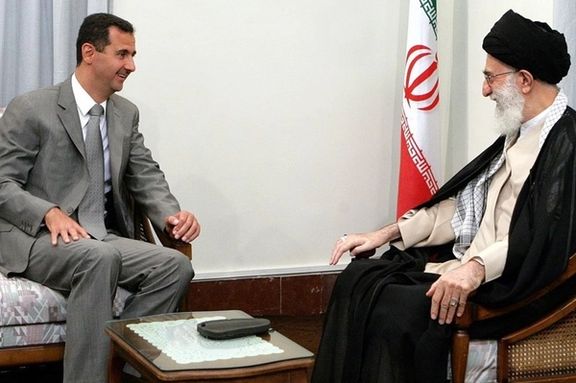
The US House of Representatives passed a bill which outlaws the normalization of ties between Washington and Syria in protest of the brutal regime of President Bashar al-Assad.
Written by Joe Wilson (R-SC), the “Assad Regime Anti-Normalization Act” was passed by a vote of 389-32.
“This bill prohibits federal officials or employees from taking any action to recognize a Syrian government led by Bashar al-Assad. The bill also expands existing sanctions related to the Syrian conflict to cover additional activities and persons,” the Congress announced.
Talking during the House session to discuss the draft law, Wilson said, “What happened in Syria was a merciless massacre, systematic rape, and chemical warfare used against the Syrian people.”
Assad’s “ability to kill the opposition and regain territory was made possible thanks to the support of like-minded war criminals … such as Putin and the Iranian regime," added Wilson, who serves as the Chairman of the Subcommittee on Middle East Affairs of the Foreign Affairs Committee of the US Congress.
Toby Dershowitz, Managing Director of the Foundation for Defense of Democracies, hailed the House’s move, saying it demonstrates that both Democrats and Republicans will continue to hold Assad and “his patron, the Islamic Republic of Iran” accountable for their actions.
Meanwhile, many Syrian activists also welcomed the passage of “Assad Regime Anti-Normalization Act,” calling it “a step in the right direction.”
The act needs to be approved by the US Senate in order to be implemented.
The war in Syria, which broke out in 2011, still rages on with the UN estimating that more than 300,000 civilians were killed in the first decade of the conflict.
During its 13 years, the war has forced more than half of the country’s 22 million pre-war population to flee their homes, a major factor in Europe’s migrant crisis.
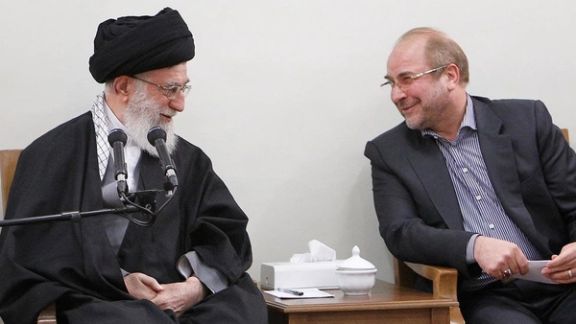
Two petitions are now underway to the Canadian government to prevent the granting of a visa to the son of Iran’s parliament speaker, Mohammad-Bagher Ghalibaf, a former top Revolutionary Guard commander.
A Canadian Federal Court document has emerged on social media in the past few days, which indicates that in 2022, Es’haq Ghalibaf, filed for the judicial review of the processing time of his immigration application and the federal court’s Justice Norris ruled that his application should be granted.
“As proud Iranian-Canadians who stand for freedom and democracy in Iran, we find it unimaginable that Canada would consider welcoming the son of such a warmonger, who, along with his father and family, has allegedly participated in money laundering and other corrupt activities,” the petition said.
“Allowing members of the dictatorship in Iran and their affiliates to enjoy freedom in Canada while they suppress Iranians and ruin the economy and environment of that proud country is unacceptable,” it added.
The court document indicates that Ghalibaf’s son, a civil engineer, was invited in December 2018 to apply for admission to Canada as a permanent resident under the Express Entry federal skilled worker program and completed his application in February 2019.
The document also shows that Pierre Poilievre's office, who is the leader of the Conservatives in parliament, made “repeated inquiries” about the progress of Ghalibaf's application from the authorities.
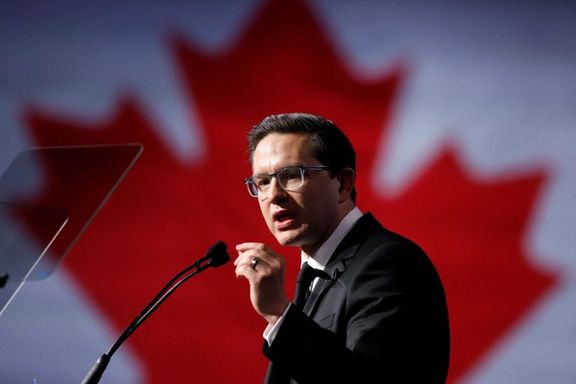
Poilievre has advocated for imposing sanction on the Revolutionary Guards (IRGC), may have been unaware of the applicant’s father’s close ties with the IRGC. However, as speaker of parliament, Ghalibaf is the third highest ranking official in the country, after Khamenei and President Ebrahim Raisi.
It is not clear how his case reached Poilievre and why he tried to help, when often thousands of immigration applicants are either denied or have to wait years to be granted entry.
The document shows that in October 2023, Ghalibaf applied to the Federal Court for an order to compel the minister of citizenship and immigration to render a decision on his application.
“Out of an abundance of caution, the applicant also named the minister of public safety and emergency preparedness as a respondent because agencies under his authority are responsible for security screening,” the document says, adding that these respondents oppose the application on the basis that the delay is reasonably explained by the need to conduct security screening.
Ahead of the upcoming elections, hardline rivals of his father have politicized the issue. The Iranian regime propagandist, conspiracy theorist, and Ghalibaf critic Ali-Akbar Raefipour urged the Speaker to explain why his son should be seeking permanent residency in a “hostile country” as Iranian hardliners call Canada.
Reminding Ghalibaf that in 2017, when he was running for president, he had said that his son only owned an old car, a motorcycle, and a small amount of money, Raefipour demanded that he also explain how much his son has invested in Canada and how he has afforded the costs of application for permanent residency and legal action against the Canadian government.
“We know about this matter due to the transparency of court cases in Canada, otherwise, Mr. Ghalibaf and his family have not given away any information,” he wrote.
“If Eshaq Ghalibaf enters Canada, it means cooperation with IRGC,” a regime critic told the Canadian Prime Minister Justin Trudeau in a tweet. “The money that Es’haq brings with him to Canada is the money of the Iranian people, the same people who are oppressed and killed by the mullahs' regime and by the IRGC.
“It is not clear what profitable work Es’haq Ghalibaf has done in less than six years, so that he already managed to obtain the financial resources required for Express Entry to Canada … and the immigration lawyer's fees,” moderate Rouydad24 website in Tehran wrote.
In April 2022 Ghalibaf’s critics accused him of hypocrisy for admonishing others for living a luxurious life, and telling Iranians they should support domestically made products. Ghalibaf had also urged tens of millions of Iranians suffering economic hardships to be patient when it was revealed that his daughter and wife had traveled to Turkey to buy luxury baby products for his yet unborn grandchild.
The revelation also caused resurfacing of other alleged corruption cases against the family including spending hefty sums on purchasing properties in Turkey and many called for his resignation. His supporters claimed rivals in intelligence agencies were behind the revelation.
Correction: The original version of this report wrongly said that Ghalibaf made repeated inquiries from Pollivier's office. The original document says that his office made inquiries. Also, the original version said that the lawmaker's office "allegedly provided a recommendation letter to Ghalibaf." This could not be verified and was deleted.

Iran’s exiled prince has blamed the West’s lenient policies toward Tehran for escalating tensions amid a simmering proxy war.
The proxies continue to operate in the region as a result of “an absence of strong leadership in the West and a weakness that is attempting some kind of appeasement of the Islamic regime in Iran,” Reza Pahlavi said in an interview with Jewish News Syndicate.
Referring to Iran’s involvement in radicalism, terrorism and the nuclear threat, he warned against the regional and global consequences of allowing the regime to continue to exist.
“The enemy, the Islamic regime in Iran, is committed to the max to do their evil deeds. The only way to counter that is to be united, to work together and to solve the problem,” Pahlavi remarked.
Citing Hamas’ October 7 onslaught on Israel, Iran’s exiled prince stressed that the international community needs to confront directly “the eye of the octopus,” referring to the Iranian regime.
“Hamas, Hezbollah and the Houthis are the tentacles of this regime that have been operating for more than four decades internationally, beyond our own region. The only way to put an end to all of this is to eliminate the source of the problems,” he went on to say.
Though Iran has avoided any direct military involvement in the Israel-Hamas conflict, the regime has used its proxy groups to attack Israeli and American targets in the Middle East.
Pahlavi called the IRGC “the de facto paramilitary mafia” which exerts its control over all aspects in Iran, urging Europe to designate it as a terrorist organization.
“That is very important because this cripples the regime and its tentacles even more,” he noted.
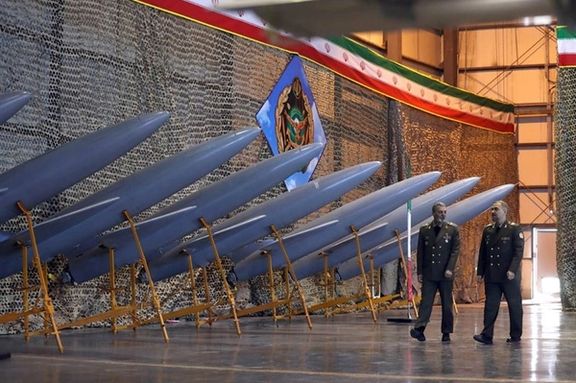
Collaborative drone research involving academics from the US, UK, and Australia with an Iranian university under international financial sanctions has stirred concerns.
According to findings by The Guardian, security experts have pointed out the direct military implications of the research, citing its relevance to drone warfare scenarios, especially in conflict zones like Ukraine and the Middle East.
Conor Healy, Director of Government Research at IPVM, emphasized the significance, stating, "There are direct implications of the technology presented in this paper for military use."
Robert Czulda, a professor in international and political studies at the University of Łódź, Poland, echoed concerns, labeling the research as "potentially very dangerous." He warned against engaging in such projects, emphasizing the ease with which technologies related to communication and signal repeating could be repurposed for military applications.
The study, published by the Institute of Electrical and Electronics Engineers in 2023, explored the use of drones in wireless networks and as communication hubs. It involved collaboration between researchers from the University of Southampton, the University of New South Wales (UNSW) in Sydney, the University of Houston, and Sharif University of Technology in Tehran.
Notably, Sharif University, known for its ties to the Iranian military, is subject to financial sanctions by the EU and UK, with a senior official from the institution sanctioned by the US. Reports suggest that Iran's rapid development in UAV technology was facilitated by research support from Sharif University.
In response, governments took action. In June 2023, the UK probed collaborations with Iran on UAV research. Similarly, Canada tightened research funding rules. The University of Houston denied affiliation, citing export laws and UNSW denied direct funding but confirmed rigorous assessments.